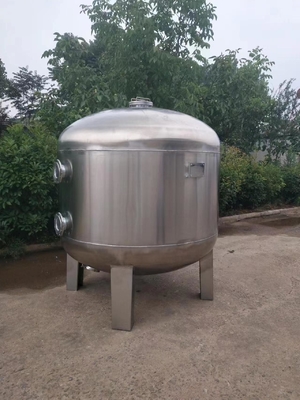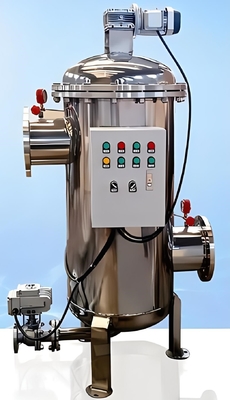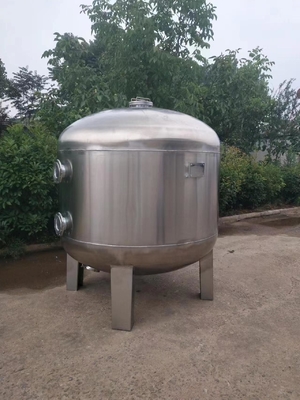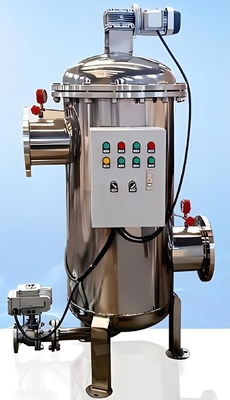-
Condensate Water Recovery Device
-
Reverse Osmosis Equipment
-
Fully Automatic Water Softener
-
Industrial Sand Filter
-
Water Supply Equipment
-
Chemical Dosing Device
-
Container Flipper
-
Container Loading and Unloading Machine
-
Truck Flipper
-
Electric Transfer Cart
-
Electronic Weighbridge
-
Mobile Loading Dock Ramp
-
Air Compressor Heat Recovery
-
Water Treatment Accessories
Manganese Sand Filter Stainless Steel 20t/H-25t/H For Drinking Water Production

Contact me for free samples and coupons.
Whatsapp:0086 18588475571
Wechat: 0086 18588475571
Skype: sales10@aixton.com
If you have any concern, we provide 24-hour online help.
x| Features | Pre-treatment For Producing Purified Water, Boiler Feedwater, Industrial Process Water, And Drinking Water. | Brand | Tonglida |
|---|---|---|---|
| Product Information | Quartz Sand Filtration, Activated Carbon Filtration, Manganese Sand Filter, Shallow Bed Sand Filtration, Self-cleaning Filtration, Precision Filtration | Purpose | Production Of Purified Water, Boiler Feedwater, Industrial Process Water, And Drinking Water Filtration System |
| Material | Stainless Steel, Carbon Steel, Fiberglass | ||
| Highlight | manganese sand filter stainless steel,20t/h quartz sand filter,20t/h manganese sand filter |
||
Product Description:
The filtration system is made up of several filters including the quartz sand filter, activated carbon filter, manganese sand filter, shallow bed sand filter, self-cleaning filter and precision filter. Depending on the user's requirements, different filter media and filter cartridges can be selected, each varying in precision. The system is effective in removing suspended solids, organic matter, colloidal particles, and other impurities from turbid water at a specific pressure. It also has the ability to eliminate odors and colors, achieving high-efficiency filtration and water purification.
This filtration equipment is essential for various industries, such as power, electronics, beverages, tap water treatment, petroleum, chemicals, metallurgy, textiles, papermaking, food, swimming pools, municipal engineering, and other processes that involve industrial water, domestic water, circulating water, and wastewater treatment. Its versatility makes it a highly coveted product, not just in the industrial sector, but also for home and personal use.
To learn more about our filtration system products, contact us today!
| Project Name | Unit | φ200 | φ300 | φ400 | φ500 | φ600 | φ800 | φ1000 | φ1200 | φ1400 | φ1400 | φ1500 | φ1600 | φ1800 | φ2000 | φ2200 |
| Filter processing | t/h | 0.5 | 1 | 2 | 4 | 6 | 8-10 | 12-16 | 20-25 | 30 | 35 | 40 | 50 | 60 | 75-80 | 100 |
| Working pressure | MPa | 0.5 | 0.5 | 0.5 | 0.5 | 0.5 | 0.5 | 0.5 | 0.5 | 0.5 | 0.5 | 0.5 | 0.5 | 0.5 | 0.5 | 0.5 |
| Operating temperature | 0C | 5-40 | 5-40 | 5-40 | 5-40 | 5-40 | 5-40 | 5-40 | 5-40 | 5-40 | 5-40 | 5-40 | 5-40 | 5-40 | 5-40 | 5-40 |
| Filter area | m2 | 0.03 | 0.07 | 0.13 | 0.2 | 0.28 | 0.5 | 0.785 | 1.13 | 1.54 | 1.54 | 1.77 | 2.01 | 2.54 | 3.14 | 3.8 |
| Filter layer height | mm | 1200 | 1200 | 1200 | 1200 | 1200 | 1200 | 1200 | 1200 | 1200 | 1200 | 1200 | 1200 | 1300 | 1300 | 1300 |
| Total height | mm | 1600 | 1800 | 1800 | 2200 | 2200 | 2400 | 2500 | 2600 | 2700 | 2700 | 2800 | 2900 | 3200 | 3400 | 3600 |
| Raw water inlet diameter | mm | 20 | 25 | 32 | 40 | 40 | 50 | 70 | 80 | 100 | 100 | 125 | 125 | 150 | 200 | 200 |
| Clean water outlet diameter | mm | 20 | 25 | 32 | 40 | 40 | 50 | 70 | 80 | 100 | 100 | 125 | 125 | 150 | 200 | 200 |
| Backwash water inlet diameter | mm | 20 | 25 | 32 | 40 | 40 | 50 | 70 | 80 | 100 | 100 | 125 | 125 | 150 | 200 | 200 |
| Compressed air inlet diameter | mm | 25 | 25 | 25 | 32 | 32 | 32 | 32 | 32 | |||||||
| Water drainage diameter for normal washing | mm | 20 | 25 | 32 | 40 | 40 | 50 | 70 | 80 | 100 | 100 | 125 | 125 | 150 | 200 | 200 |
| Backwash water drainage diameter | mm | 20 | 25 | 32 | 40 | 40 | 50 | 70 | 80 | 100 | 100 | 125 | 125 | 150 | 200 | 200 |
| Equipment weight | kg | 235 | 330 | 415 | 650 | 800 | 1300 | 2047 | 2849 | 3549 | 4090 | 4690 | 5800 | 6680 | 8530 | 9600 |
Features:
Pre-treatment is an essential step in the production of various types of water, including purified water, boiler feedwater, industrial process water, and drinking water. The pre-treatment process involves several steps that are meant to prepare the water before it can be processed and purified.
The pre-treatment process for producing purified water involves removing impurities such as dissolved solids, suspended particles, and bacteria. This process typically includes filtration, sedimentation, and disinfection to ensure the water that is processed is pure and safe for consumption.
Similarly, pre-treatment for producing boiler feedwater involves the removal of impurities such as dissolved oxygen and minerals that can cause damage to the boiler and reduce its efficiency. This type of pre-treatment typically includes chemical treatment, reverse osmosis, and deaeration processes.
Pre-treatment for industrial process water involves the removal of contaminants that can damage equipment or impact the quality of the product being manufactured. This process typically includes sedimentation, filtration, and ion exchange to remove the impurities present in the water.
Finally, pre-treatment for producing drinking water involves removing impurities such as bacteria, viruses, and other contaminants. This process typically includes disinfection, sedimentation, and filtration to ensure that the water is safe for consumption.
Technical Parameters:
Efficient filtration: On-site filtration requirements are met by selecting different filter media to remove impurities including suspended solids, organic matter, colloidal particles, microorganisms. This ultimately results in water quality improvement.
Biological purification: The degradation of harmful substances and organic matter in water is enhanced for optimal purification.
Backwash regeneration: Filter performance of quartz sand can be restored through the backwashing and regeneration process, allowing for continuous water purification.
Space-saving: The compact structure and small footprint effectively save space.
Easy installation: Simple operation and easy installation. Direct connection to the inlet and outlet water pipes allows for immediate use, and it has a long service life, effectively reducing operating costs.
Strong adaptability: It is suitable for different water qualities and quantities, exhibiting good adaptability.
Applications:
The first application for water filtration is the treatment of industrial process water, such as nozzle protection and heat exchange station water. This is important in maintaining the efficiency and effectiveness of these industrial processes.
The second application is the filtration of industrial circulating water which is used in various industries such as steel, metallurgy, papermaking, heat exchangers, power generation, petrochemicals, food, and air conditioning systems. Filtration of this water is necessary in order to prevent clogging and corrosion in the industrial equipment.
For the treatment of raw water, including surface water, rivers, lakes, and seawater, filtration is also necessary in order to remove impurities. This is particularly important in ensuring the safety and quality of drinking water and the function of other water treatment processes downstream.
Another important application of water filtration is in irrigation systems used in agricultural fields, parks, municipal water supplies, and golf courses. By eliminating suspended solids and unwanted materials, water filtration ensures the optimization of irrigation systems and promotes healthy plant growth.
Water filtration is also necessary for aquaculture, swimming pools, and water parks. By eliminating impurities, such as bacteria and debris, water filtration helps to maintain a clean and safe environment for aquatic life and recreational activities.
Lastly, water filtration is useful in various industries such as power, electronics, beverages, tap water treatment, petroleum, chemicals, metallurgy, textiles, papermaking, food, swimming pools, and municipal engineering. It is particularly useful in the treatment of industrial water, domestic water, circulating water, and wastewater, ensuring the efficiency and safety of processes in these industries.






